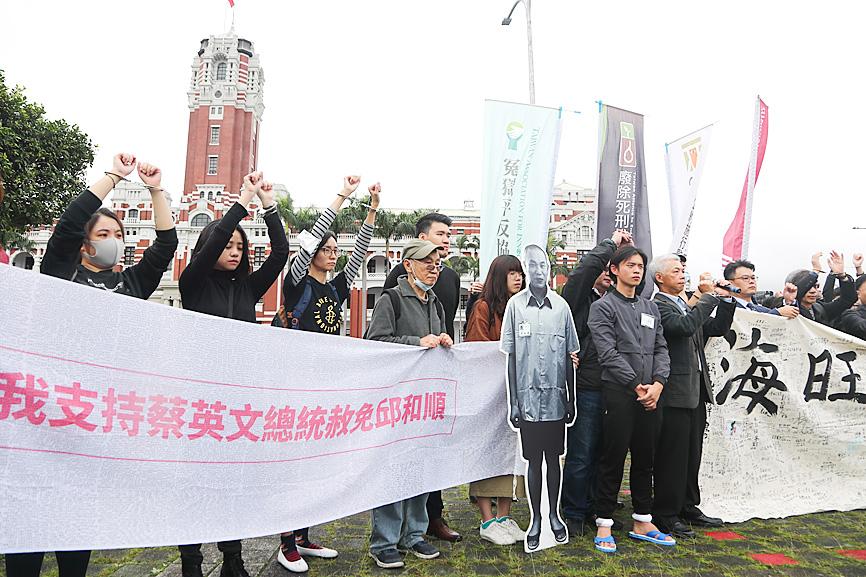Premier Su Tseng-chang (蘇貞昌) yesterday introduced a National Action Plan on Business and Human Rights, becoming the second country in Asia — after Thailand — to adopt such a measure.
The government’s strong emphasis on human rights issues, especially concerning labor conditions, could prove beneficial for Taiwan in international trade negotiations, Su told a meeting at the Executive Yuan.
The plan would aid Taiwan’s efforts to become integrated in international trade and supply chains, Su added.

Photo: CNA
The plan would focus on three main aspects — the government’s responsibility to protect human rights, companies’ responsibility to respect human rights and channels for compensation, Su said, adding that he hopes that the plan would attract foreign firms with high corporate standards to invest in Taiwan.
The Executive Yuan has said that it would introduce a draft act to adopt the UN Convention against Torture and Other Cruel, Inhuman or Degrading Treatment or Punishment, as well as the convention’s supplementary treaty.
With regard to the prohibition of torture, Su said that no amount of compensation given to victims would be enough and that all government officials must observe human rights regulations to ensure that such atrocities, while long absent in Taiwan, would not resurface.
Li Meng-yen (李孟諺), the Executive Yuan secretary-general said that the Executive Yuan is also mulling the establishment of a human rights division.
The division would oversee cross-department discussion and policy on human rights issues, Li said, adding that its work would not interfere with the Control Yuan’s Human Rights Committee, as that body is tasked with devising ongoing human rights-related policies.
Separately, President Tsai Ing-wen (蔡英文) in a prerecorded video for this year’s Asia Democracy and Human Rights Award said that the development of Taiwan’s human rights movement could offer unique insights to the international community.
The award, created by the Taiwan Foundation for Democracy in 2006, is awarded to individuals or groups that have made a significant contribution to the peaceful promotion of democracy and human rights in Asia.
Tsai praised the award winner, the Australia-based Asia-Pacific Forum of National Human Rights Institution for its efforts to promote human rights in the region, saying that the group’s dedication warrants respect.
Commenting on the establishment of Taiwan’s National Human Rights Committee in August, Tsai said that it was a milestone for Taiwan’s human rights movement.
“We are committed to promoting human rights and the forum is a partner in this effort, and a link between Taiwan and the world,” Tsai said.
Also yesterday, judicial reform advocates protested around the Presidential Office in Taipei, with their hands cuffed, calling on Tsai to pardon Chiou Ho-shun (邱和順) who has thus far served 32 years on death row.
Chiou was in 1989 sentenced to death for allegedly being involved in two murders, but civic groups say that he was wrongfully sentenced after dubious judicial proceedings.
Additional reporting by Lee Hsin-fang

Japanese footwear brand Onitsuka Tiger today issued a public apology and said it has suspended an employee amid allegations that the staff member discriminated against a Vietnamese customer at its Taipei 101 store. Posting on the social media platform Threads yesterday, a user said that an employee at the store said that “those shoes are very expensive” when her friend, who is a migrant worker from Vietnam, asked for assistance. The employee then ignored her until she asked again, to which she replied: "We don't have a size 37." The post had amassed nearly 26,000 likes and 916 comments as of this

Taiwanese can file complaints with the Tourism Administration to report travel agencies if their activities caused termination of a person’s citizenship, Mainland Affairs Council Minister Chiu Chui-cheng (邱垂正) said yesterday, after a podcaster highlighted a case in which a person’s citizenship was canceled for receiving a single-use Chinese passport to enter Russia. The council is aware of incidents in which people who signed up through Chinese travel agencies for tours of Russia were told they could obtain Russian visas and fast-track border clearance, Chiu told reporters on the sidelines of an event in Taipei. However, the travel agencies actually applied

US President Donald Trump said "it’s up to" Chinese President Xi Jinping (習近平) what China does on Taiwan, but that he would be "very unhappy" with a change in the "status quo," the New York Times said in an interview published yesterday. Xi "considers it to be a part of China, and that’s up to him what he’s going to be doing," Trump told the newspaper on Wednesday. "But I’ve expressed to him that I would be very unhappy if he did that, and I don’t think he’ll do that," he added. "I hope he doesn’t do that." Trump made the comments in

Tourism in Kenting fell to a historic low for the second consecutive year last year, impacting hotels and other local businesses that rely on a steady stream of domestic tourists, the latest data showed. A total of 2.139 million tourists visited Kenting last year, down slightly from 2.14 million in 2024, the data showed. The number of tourists who visited the national park on the Hengchun Peninsula peaked in 2015 at 8.37 million people. That number has been below 2.2 million for two years, although there was a spike in October last year due to multiple long weekends. The occupancy rate for hotels